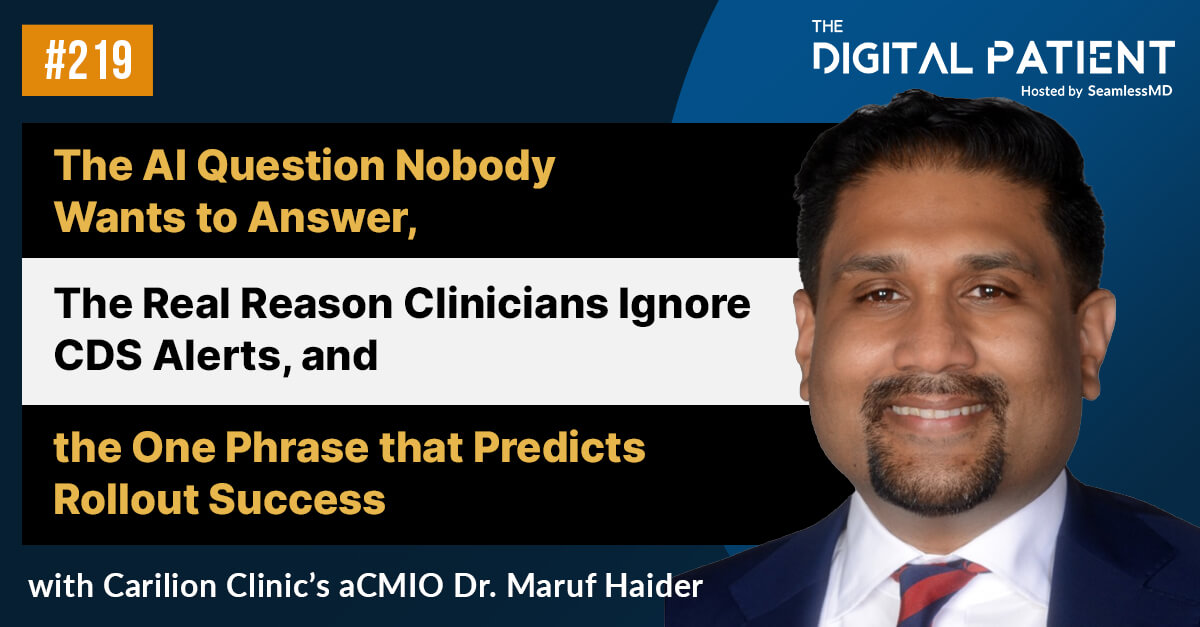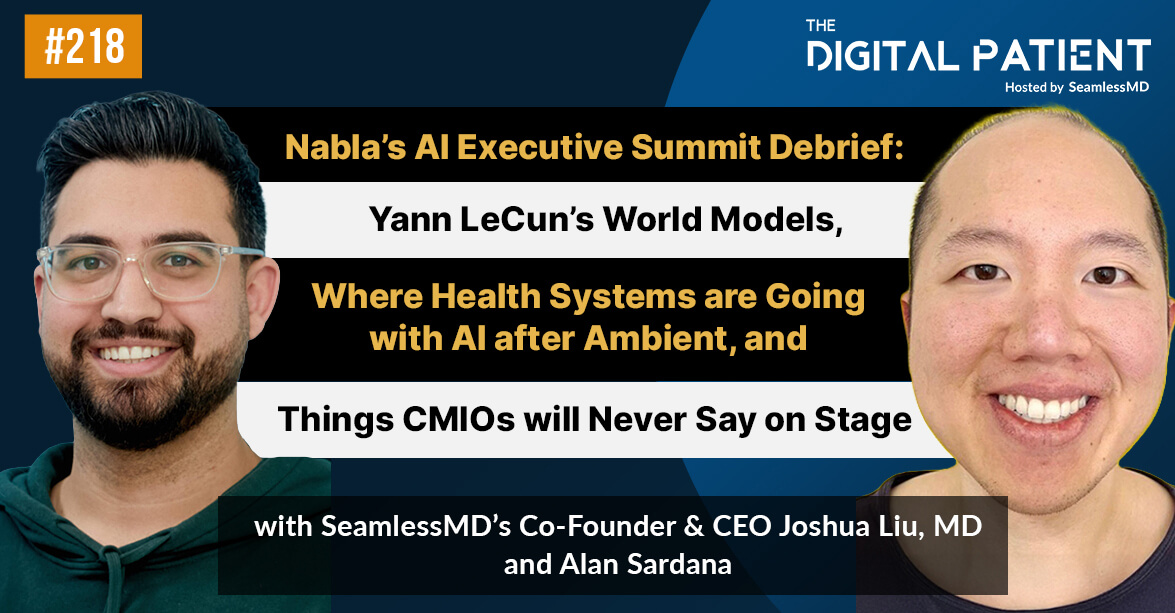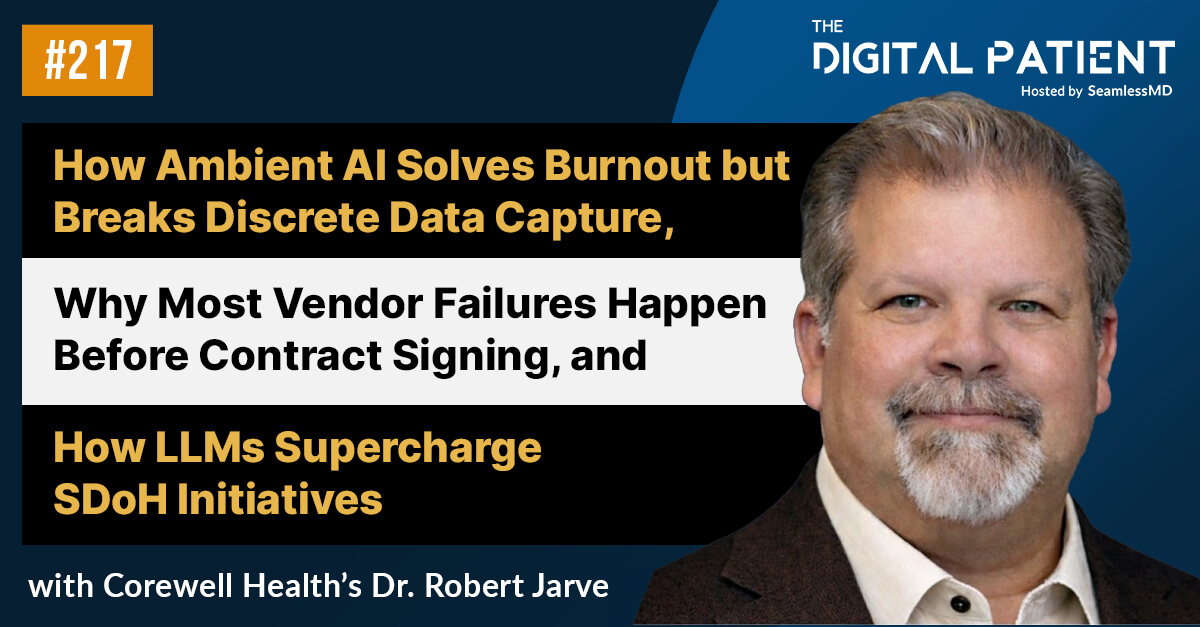Subscribe on: RSS | SPOTIFY | APPLE PODCAST | GOOGLE | BREAKER | ANCHOR
On this episode of "The Digital Patient" podcast, hosts Alan Sardana & Dr. Joshua Liu speak with Dr. Damon Broyles, Vice President of Clinical Innovation at Mercy Technology Services, about "Why Digital/Innovation leaders must reduce burdens on healthcare staff, Incubating healthtech startups to align with community needs, and Serendipitous collisions in healthcare innovation ecosystems". Click the play button to listen or read the show notes below.
Audio:
Video:
Guest(s):
- Dr. Damon Broyles, Vice President of Clinical Innovation at Mercy Technology Services
- Dr. Joshua Liu (@joshuapliu), Co-founder & CEO at SeamlessMD
Episode 88 - Show Notes:
[00:00] Introducing Dr. Damon Broyles, Vice President of Clinical Innovation at Mercy Technology Services;
[2:20] How Dr. Broyles' initial drive to join healthcare dates back to his childhood; his father was involved in healthcare technology sales for Hewlett Packard, and would bring home medical technologies for practice and explanation, sparking Dr. Broyles' curiosity and love of science and biology;
[03:37] Why Dr. Broyles believes his training and specialty in family medicine prepared him well for health IT as the diagnostic process, collaboration, and understanding of ambiguity in primary care is similar to the work of a healthcare technologist;
[06:35] How Dr. Broyles got into leadership roles in health IT by following his curiosity and saying yes to opportunities, enjoying the creativity and challenge of it learning;
[08:49] How the role of a CMIO has evolved over time from a focus on implementing and adapting to EHR to a focus on patient portals, health information exchange, and personalization;
[12:00] Why Dr. Broyles believes as digital health becomes more dynamic, the role of a CMIO is becoming more similar to that of a Chief Digital Information Officer, with a focus on curation of data and actionable tools and information;
[17:11] Why Dr. Broyles believes startups trying to break healthcare make two critical mistakes:
- They do not understand the complexity of the sales cycle in healthcare and the many stakeholders involved; and
- They cannot clearly articulate if a product or service is a feature to enhance their EHR or a fully mature product;
[20:07] Why Dr. Broyles advocates for a shift in perspective from viewing hospitals as revenue generators to viewing them as costs centers, aligning incentives with value-based care;
[24:58] How Mercy collaborated with other systems in the region during the pandemic to reduce the burden on any one hospital and how this process inspired Dr. Broyles as it highlighted the talent and bright minds in healthcare working together for the greater good;
[28:22] Why Dr. Broyles believes aligning with value-based care models is important for unlocking creativity and new perspectives, and how the right incentives can lead to even faster innovation;
[31:00] Why Dr. Broyles believes it is important to understand the complexity of the problems so that solutions accommodate edge cases and do not overlook complexity, leading to risk aversion and resistance to change;
[33:00] How bias in machine learning models is often harder to identify in healthcare than in other fields due to its complexity and why Dr. Broyles suggests focusing on the problem and remediating the inputs and upstream social determinants of illness in addition to the model's outputs;
[40:12] Why Dr. Broyles is most excited about “hyper automation”, technologies that support preventative and proactive care, and technologies that better support both the providers and patients;
Fast 5 / Lightning Round:
- What is your favorite book or book you’ve gifted the most?
“Superintelligence: Paths, Dangers, Strategies” by Nick Bostrom
“The Premonition: A Pandemic Story” by Michael Lewis
“When Breath Becomes Air” by Paul Kalanithi
- Who is a person–dead or alive–you’d love to meet?
“Jon Stewart"
- Would you rather have Super strength, super speed, or the ability to read people’s minds?
“Mind reading”
- What is something in healthcare you believe that others might find insane?
“Doctors and nurses tend to be the most thoughtful and creative minds in the organization but are bound by constraints.”
- COVID-19 lockdown related – what is 1 hobby or activity you’ve gotten into since the pandemic?
“Viticulture (wine growing, not the board game)”
.svg)










.png)
